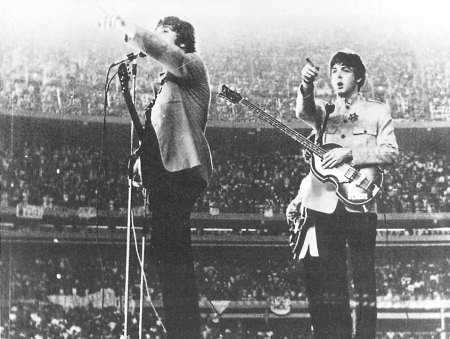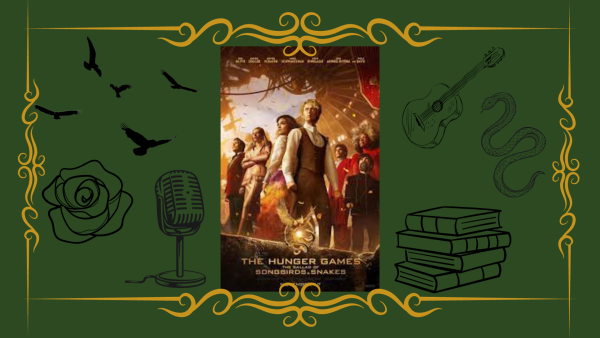Taking those old records off the shelf: The Journey of Rock

The Beatles making a historic performance at Shae Stadium.
Legend says that on one early morning in the 1930’s, a man named Robert Johnson sold his soul to the Devil in exchange for the blues. He played his heart out without any thought that it would evolve. He thought the music was nothing more than what he felt and that it would just pass on. He didn’t know it at the time, but he couldn’t have been more wrong. People listened and things got set in motion; things that would change every thing.
After Johnson’s revelation of music, people started to not only listen to it, but find solace and joy in it. Two of those men were Elvis Presley and Chuck Berry. Elvis brought swagger and a “heartbreaker persona” to blues, while Chuck found that “soft” blues wasn’t good enough and made it Rock. He wrote a song entitled “Johnny B. Goode” and shook the foundation of music with the now iconic opening and his disregard for the media. Like many others, his music, which was now being played everywhere, was being called “satanic” by the press. What they didn’t understand was that they were just making everyone want to hear it more.
Even though Rock had gotten a lot of people’s attention, it couldn’t survive without heavier hitters. It needed immortalization. In 1960, it got what it so desperately needed in the form of four guys from Liverpool. Their name: The Beatles. The Beatles broke every conceivable record and influenced the very fabric of music. They were also the first Rock band to win the Album of the Year award at the Grammy’s for their 1967 album ” Sgt. Pepper’s Lonely Hearts Club Band,” which is now considered to be greatest album of all time. Rock was now in the limelight.
The 60’s also saw a rise of folk acts like Bob Dylan and Janis Joplin who both sang about their distaste for war and lead the first anti-war movements against the government. Psychedelic music also began to rise with Jimi Hendrix and Eric Clapton using their immense guitar abilities to act as translators for all their anguish. This is best displayed by Jimi Hendrix, who famously played the Star-Spangled Banner on his guitar at the Woodstock festival of music.
While the 60’s were innovative, the 70’s were extraordinary. The creative influences of the previous decade flowed out in the form of legendary acts like Pink Floyd, Black Sabbath, Rush, AC\DC, Queen, The Grateful Dead, and David Bowie. Pink Floyd’s album “The Dark Side of the Moon” broke music and widened the gaze of traditional music lovers, while Black Sabbath’s debut popularized heavy metal. Every decade has a band that rules the medium and for the 70’s, that band was named Led Zeppelin. They perfected The Beatles’ work and created musical and cultural change with over a dozen best selling albums. They wrote some of the most famous songs in music, which is made clear by their Magnum Opus “Stairway to Heaven,” which is applauded as the greatest Rock song ever written.
The 1980’s rolled in with Punk in the forefront with acts like The Clash making waves with radical thoughts against the establishment. “Hair Bands” that sang about love and not much more also came to fame. The 80’s saw Van Halen, alongside the amazingly talented Eddie Van Halen, show the chaotic and fun side of Rock compared to the uninteresting acts the came with them.
In the early 90’s Nirvana and other grunge performers made headlines with their angst-filled lyrics about teenage years and made millions of kids feel like their voice was finally being heard. Later in the decade, Rock became more pop orientated and less popular. Oasis and Radiohead showed Rock was still alive, but how long could it last?
The 2000’s really showed the decline of Rock with The White Stripes being the only really note-worthy band in the genre. The 2010’s are even more unclear about the fate of the once proud music. The Arctic Monkeys and The Black Keys show Rock isn’t dead, but it may be impossible to tell if any innovative acts are left.
Whatever the future holds for Rock and music as a whole, we should remember its humble beginnings. Even if Robert Johnson didn’t really sell his soul to the Devil on that fateful day,there is no denying that his random scribbles on a sheet paper changed every thing.
Your donation will support the student journalists of Tunstall High School. Your contribution will allow us to purchase equipment and cover our annual website hosting costs.

Noah Barker is a junior taking part in his second year at the Trojan Messenger. Outside of school, Noah Barker can be heard at any point in a three-mile-radius...
















